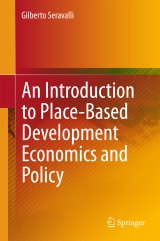Details

An Introduction to Place-Based Development Economics and Policy
|
53,49 € |
|
| Verlag: | Springer |
| Format: | |
| Veröffentl.: | 11.02.2015 |
| ISBN/EAN: | 9783319153773 |
| Sprache: | englisch |
Dieses eBook enthält ein Wasserzeichen.
Beschreibungen
This book introduces the reader to local development economics and policy, with a special focus on the place-based paradigm that covers its justification, its difficulties and the types of public intervention that it suggests. The starting point for the analysis is that economic development in lagging places is not to be expected as the result of a mechanism of automatic convergence between backward and advanced regions and that, therefore, the most appropriate development policy is not to maximize competition among all agents in all sectors and places. The failure of the Washington Consensus is examined, and the two competing positions to have emerged from this failure – spatially blind interventions and place-based policies – are contrasted. The main shortcoming of spatially blind policies, namely that immobile resources that could trigger or support a development process often remain untapped or “trapped”, is emphasized. The limitations of the “big push” state intervention and wage flexibility solutions to this trap are analyzed and the merits of place-based policies that support intervention and can deal with uncertainty, risk and conflict are discussed.
1 Spatially-blind vs place-based policies.- 2 The spatial perspective.- 3 Institutions, agency and path dependency.- 4 Under valorized areas.- 5 Dealing with uncertainty.
Gilberto Seravalli was Full Professor of Development Economics at Parma University (Italy) until his retirement and he also taught at the University of California (Berkeley, United States) and directed the “Fondazione Nitti” residential school of advanced studies in development policies. Prof. Seravalli is a member of the PhD in Urban Studies Committee at GSSI – Gran Sasso Science Institute (Italy). He has published many books and articles on economic development, spatial economics and innovation.
This book introduces the reader to local development economics and policy, with a special focus on the place-based paradigm that covers its justification, its difficulties and the types of public intervention that it suggests. The starting point for the analysis is that economic development in lagging places is not to be expected as the result of a mechanism of automatic convergence between backward and advanced regions and that, therefore, the most appropriate development policy is not to maximize competition among all agents in all sectors and places. The failure of the Washington Consensus is examined, and the two competing positions to have emerged from this failure – spatially blind interventions and place-based policies – are contrasted. The main shortcoming of spatially blind policies, namely that immobile resources that could trigger or support a development process often remain untapped or “trapped”, is emphasized. The limitations of the “big push” state intervention and wage flexibility solutions to this trap are analyzed and the merits of place-based policies that support intervention and can deal with uncertainty, risk and conflict are discussed.
<p>Follows an analytical path that clarifies the logic, merits and demerits of competing development paradigms</p><p>Presents practical examples that will help the reader to better understand theoretical issues</p><p>Examines underdevelopment traps, proposed solutions and their shortcomings</p><p>Includes supplementary material: sn.pub/extras</p>
Diese Produkte könnten Sie auch interessieren:

Integration, Growth, and Cohesion in an Enlarged European Union

von: John Bradley, George G. Petrakos, Julia Traistaru

149,79 €

Rethinking Regional Innovation and Change: Path Dependency or Regional Breakthrough

von: Gerhard Fuchs, Philip Shapira

149,79 €














